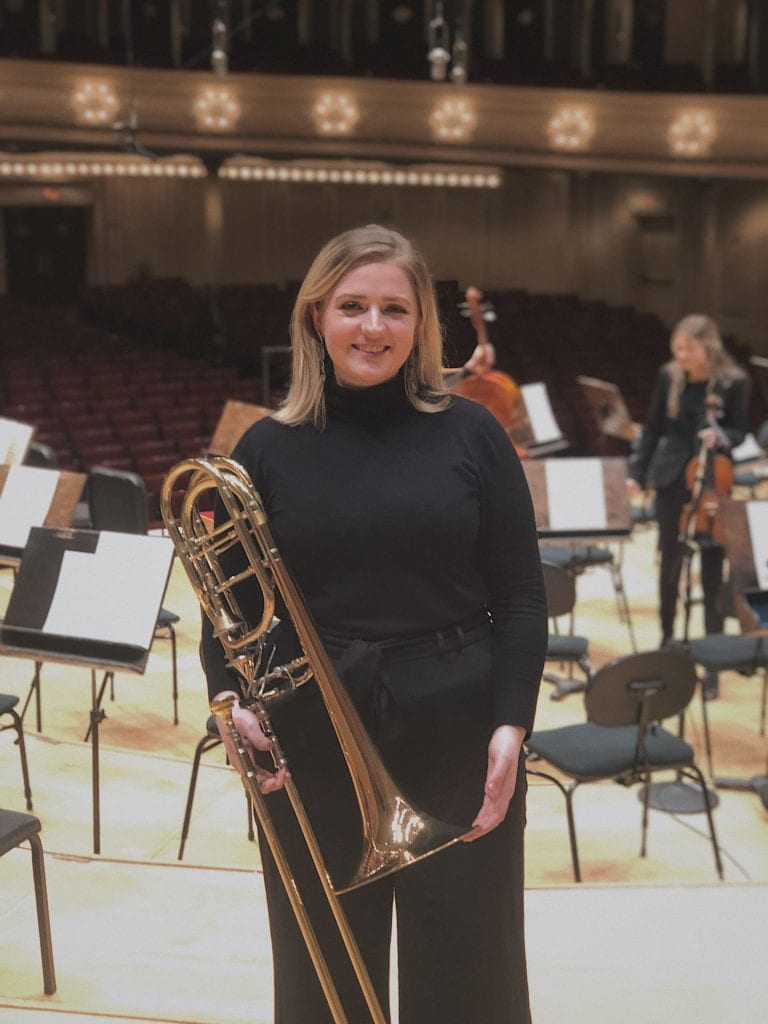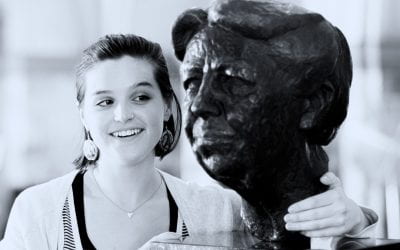Change & Resilience at the Center for Arts Leadership
Arts & Cultureby Haley Henning (BMA Trombone Performance and Languages ’21)
I write this as many changes occur in our lives. As afternoon turns to evening. As fall gives way to winter. As I see the shift from student to True Adult With Full Time Job on my horizon (…hopefully). As my heart is heavy while COVID-19 continues its course of destruction. While I see Black and Brown lives lost to police brutality with no justice being brought.
We are in some times now, aren’t we? And while times change in micro and macro ways, while our mental fortitude must not let up, I find reflection a powerful tool for moving forward.
I’ve changed quite a lot this year. I have learned the importance of self-care and of setting boundaries, professionally and personally. I have learned to get to the core of what it is that I value in life. I have learned that I can support justice and change in both big and small ways.

Haley Henning
And if any industry fully recognizes the value of change and resilience in 2020, it is the performing arts. Navigating an almost complete shutdown of our industry while trying to find ways to collaborate artistically, engage our communities, and learn virtually has proven challenging. This is not to mention the resurgence of urgency in addressing systemic racism following the brutal murder of George Floyd by police officers, which has put pressure on the arts to confront institutional and personal involvement in the marginalization and othering of Black and Brown people — including within Roosevelt University’s Chicago College of Performing Arts.
Two things have been made clear this year: performing artists must stay strong in the face of global crisis, and we also must play our part in the fight for justice.
The Center for Arts Leadership
The Center for Arts Leadership is a relatively new office within the Chicago College of Performing Arts that is in a unique position to support needed cultural change within our institution. But, before I explain more, I’m sure most of you reading are probably wondering what the Center for Arts Leadership is.
The Center was founded in 2017 by CCPA alumna, cellist and arts leader Allegra Montanari with the mission of providing students in the CCPA music and theatre conservatories with opportunities for professional development, community engagement and practicing social justice. The Center is also home to grants, resources, events and student groups to accomplish this mission.
Since its creation, the Center has been home to initiatives that celebrate, support, and empower student voices, including a Social Justice Residency, Social Justice Seed Grant, and through the support of numerous student-led cultural celebrations such as Color Me and Mi Latinidad.
To add onto our mission this year, the Center hired CCPA alumnus and artist-faculty Adrian Dunn to be CCPA’s Advisor for Racial Equity and Minority Student Success. As part of his role, Adrian leads the Minority Student Success Initiative, with the goal of providing support and mentorship for minority-identifying CCPA students.

Interested in learning more about the Center?
I hope you are! If you would like to learn more about the Center for Arts Leadership, connect with us, or learn how you can get involved, reach out to CAL Director Allegra Montanari at amontanari@roosevelt.edu.
Reevaluating our mission
Over the summer, the Center also took time to reevaluate its mission and commitments to the CCPA community:
- We will insist on cultural change for our college, University and beyond.
- We will communicate clearly and regularly. Transparency is essential to building trust — regardless of, and especially within, power dynamics across the college.
- We will give the opportunity for all students and faculty to engage with our resources and programs.
- We encourage students to shape a definition of success that speaks to their own path.
- We will prompt students to act in a way that considers their role as artists, and as humans, in their communities.
- We will have tough conversations. Without embracing our failures, we cannot be a part of the solution.
- We hold ourselves and our college accountable to the promises we make in our statements and our mission.
Essential in the Center’s commitments is the fact that we must embrace our failures and hold ourselves accountable in order to achieve progress.
– Haley Henning (BMA ’21)
Essential in the Center’s commitments is the fact that we must embrace our failures and hold ourselves accountable in order to achieve progress. Even if the performing arts world as a whole is not committed to tearing down the systemic racism in our industry, the Center will do everything it can to support students and alumni.
Finding connection during a pandemic
The Center has also worked to ensure that community and artistic opportunities can still be fostered during COVID-19. Since the summer, the Center has:
- Collaborated with the Roosevelt University Counseling Center to provide resources and self-care mini-sessions to CCPA students.
- Supported the launch of the CCPA Student Collaboration Collective, created by CAL Collaboration and Community Engagement Assistant Jade Garcia (MM Clarinet Performance ’21).
- Fostered community through the development of the CCPA Peer Connection Program.
- Worked with our community partners to create virtual performance opportunities to engage artistically with our Chicago community.
- Used social media as a platform to highlight, celebrate and share the voices of our student bodies, including through a National Hispanic Heritage Month celebration.
- Begun a monthly email newsletter, The CAL Chronicle, to highlight our efforts and initiatives to the CCPA community.
At a time when community has been lost and our industry has been shaken to its core, the Center is trying to host connections and opportunities for our CCPA community. We hope that, by being a space for collaboration, sharing resources and lending support to those who need it, we can create positive change within our community while showing others in the industry how to step up to the responsibility of being a leader in the arts.
More in this section
In Memoriam | Winter 2024
Roosevelt University extends its deepest sympathy to the loved ones of recently deceased alumni and friends.
Roosevelt to launch alumni scholarship program
University leaders hope a new scholarship program will encourage alumni looking to continue their education to include Roosevelt on their list of potential universities.


